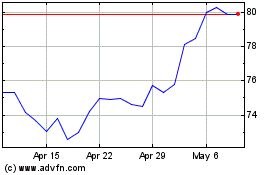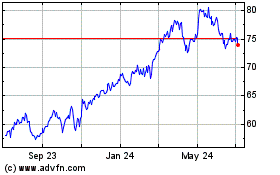Pay Czar Approves Unchanged $10.5 Million Salary For AIG's Benmosche
April 05 2012 - 9:35AM
Dow Jones News
The U.S. government's pay czar approved an unchanged $10.5
million salary for American International Group Inc. (AIG) Chief
Executive Robert Benmosche for 2011, though the company showed his
total compensation rose 66% using another method for calculating
his pay.
The 2011 plan approved by the U.S. Treasury's so-called special
master allowed Benmosche to earn a cash salary of $3 million for
the year and get a "stock salary" of $7.5 million, according to an
AIG filing with securities regulators Thursday.
The total amount approved by the pay czar was unchanged from a
year earlier, but the timing of when a portion of Benmosche's 2010
compensation was paid resulted in the 66% increase to $14 million
from $8.4 million when calculated according to the rules governing
how companies report executive pay to the U.S. Securities and
Exchange Commission.
The government gets to shape AIG's pay proposals because the
insurer received a government rescue beginning in 2008. The
Treasury has been selling off its stake in the company over the
past year, but still owns 70% of AIG.
Since 2009, the special master has determined that compensation
for AIG's top 100 employees should be based primarily on
performance, and has pushed for a large portion of the compensation
to be paid in stock that executives can't sell for a year or more.
Cash salaries in most cases have been limited to $500,000.
AIG said the restrictions on cash salaries have meant the
company's top 25 executives are getting cash compensation that's
"lower than ever before" and "significantly lower than AIG's
competitors."
Benmosche and Peter Hancock, the head of AIG's property-casualty
unit, were the only executives named in the filing who earned cash
salaries above $500,000 in 2011.
-By Erik Holm, Dow Jones Newswires; 212-416-2892;
erik.holm@dowjones.com
American (NYSE:AIG)
Historical Stock Chart
From Mar 2024 to Apr 2024

American (NYSE:AIG)
Historical Stock Chart
From Apr 2023 to Apr 2024
